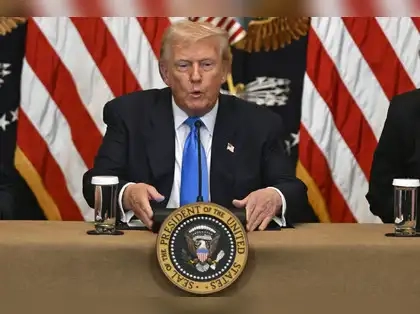Synopsis
President Trump announced on Truth Social that the planned tariff hike on Mexican goods would be postponed. Following discussions with President Claudia Sheinbaum, the existing 25 percent tariff on goods not covered by the North American trade pact will remain in place for another 90 days. This extension mirrors the terms of the previous agreement between the two nations.
 AP
AP President Donald Trump (File Photo)
US President Donald Trump said Thursday he would hold off a planned tariff hike on Mexican products and instead keep duties at existing levels for 90 days after speaking with his counterpart Claudia Sheinbaum.Tired of too many ads? Remove Ads
"We have agreed to extend, for a 90 Day period, the exact same Deal as we had for the last short period of time," Trump wrote in a Truth Social post. The country currently faces a 25 percent US tariff for goods not entering under a North American trade pact. Want a Loan? Get cash against your Mutual Funds in 4 hours Trump said that goods from Mexico imported into the U.S. would continue to face a 25% tariff that the U.S. president has ostensibly linked to fentanyl trafficking. The Republican said that autos would face a 25% tariffs, while copper, aluminum and steel would be taxed at 50%.Trump is expected to issue tariff rate proclamations later on Thursday for countries that have not struck trade deals by a 12:01 a.m. EDT (0401 GMT) deadline.South Korea agreed on Wednesday to accept a 15% tariff on its exports to the U.S., including autos, down from a threatened 25%, as part of a deal that includes a pledge to invest $350 billion in U.S. projects to be chosen by Trump.
Tired of too many ads? Remove Ads
But goods from India appeared to be headed for a 25% tariff after talks bogged down over access to India's agriculture sector, drawing a higher-rate threat from Trump that also included an unspecified penalty for India's purchases of Russian oil.


 Although negotiations with India were continuing, New Delhi vowed to protect the country's labor-intensive farm sector, triggering outrage from the opposition party and a slump in the rupee.TOUGH QUESTIONS FROM JUDGESTrump hit Brazil on Wednesday with a steep 50% tariff as he escalated his fight with Latin America's largest economy over its prosecution of his friend and former President Jair Bolsonaro, but softened the blow by excluding sectors such as aircraft, energy and orange juice from heavier levies.The run-up to Trump's tariff deadline was unfolding as federal appeals court judges sharply questioned Trump's use of a sweeping emergency powers law to justify his sweeping tariffs of up to 50% on nearly all trading partners.Trump invoked the 1977 International Emergency Economic Powers Act to declare an emergency over the growing U.S. trade deficit and impose his "reciprocal" tariffs and a separate fentanyl emergency.The Court of International Trade ruled in May that the actions exceeded his executive authority, and questions from judges during oral arguments before the U.S. Appeals Court for the Federal Circuit in Washington indicated further skepticism."IEEPA doesn't even say tariffs, doesn't even mention them," Judge Jimmie Reyna said at one point during the hearing.CHINA DEAL NOT DONE
Although negotiations with India were continuing, New Delhi vowed to protect the country's labor-intensive farm sector, triggering outrage from the opposition party and a slump in the rupee.TOUGH QUESTIONS FROM JUDGESTrump hit Brazil on Wednesday with a steep 50% tariff as he escalated his fight with Latin America's largest economy over its prosecution of his friend and former President Jair Bolsonaro, but softened the blow by excluding sectors such as aircraft, energy and orange juice from heavier levies.The run-up to Trump's tariff deadline was unfolding as federal appeals court judges sharply questioned Trump's use of a sweeping emergency powers law to justify his sweeping tariffs of up to 50% on nearly all trading partners.Trump invoked the 1977 International Emergency Economic Powers Act to declare an emergency over the growing U.S. trade deficit and impose his "reciprocal" tariffs and a separate fentanyl emergency.The Court of International Trade ruled in May that the actions exceeded his executive authority, and questions from judges during oral arguments before the U.S. Appeals Court for the Federal Circuit in Washington indicated further skepticism."IEEPA doesn't even say tariffs, doesn't even mention them," Judge Jimmie Reyna said at one point during the hearing.CHINA DEAL NOT DONE Tired of too many ads? Remove Ads
U.S. Treasury Secretary Scott Bessent said the United States believes it has the makings of a trade deal with China, but it is "not 100% done," and still needs Trump's approval.U.S. negotiators "pushed back quite a bit" over two days of trade talks with the Chinese in Stockholm this week, Bessent said in an interview with CNBC. China is facing an August 12 deadline to reach a durable tariff agreement with Trump's administration, after Beijing and Washington reached preliminary deals in May and June to end escalating tit-for-tat tariffs and a cut-off of rare earth minerals.
China is facing an August 12 deadline to reach a durable tariff agreement with Trump's administration, after Beijing and Washington reached preliminary deals in May and June to end escalating tit-for-tat tariffs and a cut-off of rare earth minerals.




